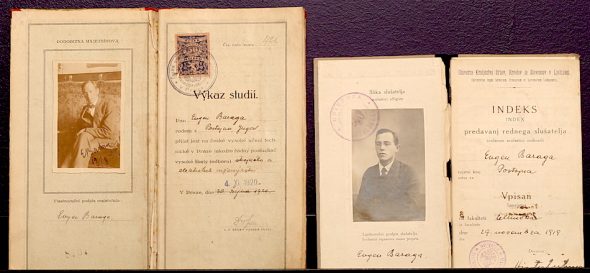Eugen Baraga university records, Slovenia, 1919-20

I bought these two university records for Eugen Baraga in Ljubljana. At the antiques store, the marked prices were wildly ambitious but the owner had a white pointed Hercule Poirot mustache and a negotiating style that benchmarked to his appetite. So the first time I went in I got a small collection of things for a quite modest amount because he was only thirsty so wanted some good beer; the second time, however, he was hungry and meeting a friend for Japanese food so prices rose accordingly. Still, he was genial and explained, with no small amount of enthusiasm, the purpose and history of every photograph and document I was purchasing. I regret, then, not having written down the details because I now have these university records displayed prominently at home and have come to know Eugen Baraga and his Woodrow Wilson visage with some familiarity, yet what I know about him involves much speculation.
The most immediately arresting fact is that the earlier of the two records is dated 29 November 1919, just five months after Germany signed the Treaty of Versailles officially ending World War 1 and still some eight months before Austria, which had been the imperial power in Slovenia, did so. That and Eugen Baraga’s receding hairline lead me to surmise that his enrollment was likely delayed by the war, which along the Soča Front on Slovenia’s western border with Italy had been fantastically bloody even by the standards of WWI — an event known to Americans, if it is known at all, mainly for having been depicted by Ernest Hemingway in A Farewell to Arms.
Baraga himself was from Postojna, midway between Trieste and Ljubljana, and studied mechanical engineering. He was attending what was then called the University of the Kingdom of the Serbs, Croats and Slovenes in Ljubljana and when I researched this I discovered a second arresting fact: both the Kingdom and the University were birthed by WWI and the collapse of the Austro-Hungarian empire. Indeed, Eugen Baraga appears to have been one of the university’s inaugural students as its first-ever lectures began four days after his enrollment.
And then, as far as I can tell, he disappeared. The only subsequent reference to a time period-appropriate Eugen Baraga I could find was, unexpectedly, as a contributor to the Romanian branch of Radio Free Europe/Radio Liberty, where on the Romanian-language Wikipedia page he’s listed as a master typographer.


This entry was posted on Monday, September 3rd, 2018 at 6:07 am. It is filed under Found Object and tagged with Eugen Baraga, Europe, Ljubljana, photography, Slovenia, Yugoslavia. You can follow any responses to this entry through the RSS 2.0 feed.
Comments are closed.
Follow me on Twitter
Bio
 Sean Rocha is a writer and photographer based in New York. He has lived in Hong Kong, Cairo and Paris and his work has appeared in the New York Times, Travel + Leisure, Slate, Le Monde d'Hermès, Condé Nast Traveler, and read more...
Sean Rocha is a writer and photographer based in New York. He has lived in Hong Kong, Cairo and Paris and his work has appeared in the New York Times, Travel + Leisure, Slate, Le Monde d'Hermès, Condé Nast Traveler, and read more...